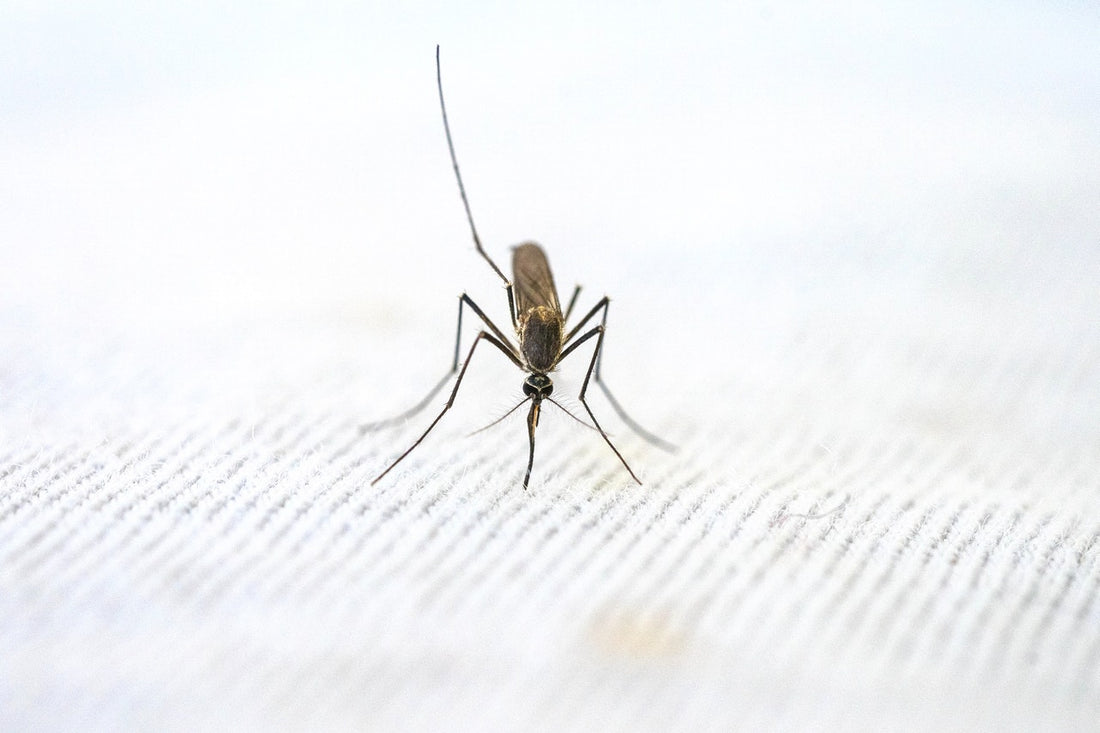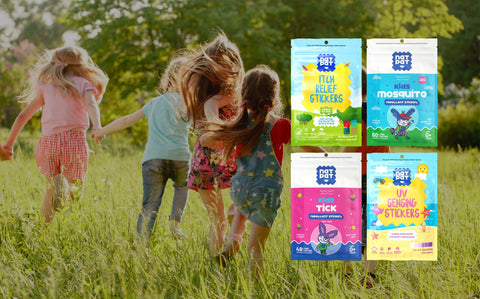How Long Does It Take For Mosquito Bites To Go Away?
- person Gary Tramer
- calendar_today
- comment 0 comments

“It ITCHES!” might as well be the cry of the summer months from dawn to dusk—but how long should you expect a single mosquito bite to cause discomfort and itching to your kiddo?
Generally, the answer is anywhere from a few days to a few weeks.
HOWEVER, we have lots of other information that can help you along as you wait for that bite to heal.
Read on for more info on insect repellents, home remedies, and over-the-counter solutions to these annoying bug bites.
Why Do Mosquito Bites Itch?
Have you ever wondered why a mosquito bite itches so badly while an ant bite might just hurt? And why do some bites hurt a lot more than others? We have some of the answers.
Mosquitoes are sneaky about biting you—so sneaky, in fact, that you might not even notice it happens. Yet, when you have the misfortune of running afoul of wasps, bees, and spiders, you probably feel it immediately.
Have you ever wondered why that is? There are several reasons why mosquitoes are so good at this process, and a lot of it is related to the itch we feel later on.
Mosquitoes have itty bitty little legs, and our skin is often not sensitive enough to even feel them land. While that may answer part of the question, you’re probably still wondering how a mosquito can bite through your skin without you feeling a thing.
Why Can't I Feel Mosquito Bites?
Mosquitoes have a specialized mouthpart that can bite while also injecting their saliva into the host that they’re feeding on (YUCK). Their saliva actually contains two components that aid in their dining habits.
First, a mosquito's saliva acts as an anticoagulant (a clot preventer). This allows them to eat more for a longer period of time, and the blood doesn’t congeal as they are ingesting it.
Second, they have an anesthetic within their saliva. This means it actually numbs your skin in the area they are biting. Sometimes they may not inject enough, which leads to you noticing the bite, but typically they’re pretty sneaky about it.
This saliva injection is also what later causes so much itching. However, it’s not the saliva itself that itches; it’s the response by your immune system behind it all. Your body sends cortisone to the bite area because it responds to the saliva as if it is an allergen. This results in the raised, itchy bumps we know as mosquito bites.
This is why one of your kids might end up with large welts while the other only has tiny bumps. Everybody reacts differently to mosquitoes. Some are more reactive than others and produce a more severe response to the bite. Some symptoms may require immediate medical attention, while others are okay taking some topical or oral antihistamines.
So, are all mosquitoes out to get you and your little ones? Not quite. Only female mosquitoes bite. The males feed on plants and nectar: like hummingbirds, but less cute.
Methods To Stop Mosquito Bite Itching
So you or your kids have been bit by a mosquito: now what? Waiting it out can seem near impossible during the summer months when it is so easy to accidentally get a bite regardless of the precautions you’re taking.
As we explained before, mosquito bites are largely formed because of your body’s natural response to the saliva that is injected at the time of the bite. There are many ways to calm the itching that can result from these bites.
We’ve compiled a list of these methods below:
1. Magic Itch Relief Patch
The Natural Patch Co. has your back when mosquitoes attack! It’s called our Magic Patch Itch Relief, and it can be applied just like a sticker or bandage. This super simple product is able to soothe the itchiness that’s left after a mosquito bite so that you or your little one can go on with your lives without the bite ruining the day.
Covering the bite with this patch accomplishes several things:
First, it prevents itching—and nobody wants to feel itchy longer than they have to. Second, it helps prevent little fingernails from breaking the skin and introducing yucky bacteria to the site (because nobody wants to deal with an infection). Finally, the patch design protects the area and prevents clothing or other things from brushing against the bite and causing irritation.
And… Guess what? It’s natural! That’s right: At The Natural Patch Co., we strive to make our products with ingredients that we love, and we LOVE natural things. The fun with this product comes in the different colors that your kids will love to wear (and adults can use them too).
2. Apply Lotions or Creams
Calamine lotion has long been used to calm itchy or inflamed skin due to bites or other reactions like poison ivy. This bubblegum pink lotion doesn’t turn clear, though, so it looks like you and your kid were scribbled on with some pink sidewalk chalk.
It tends to flake off on couches and carpets, which is not ideal for active kids (or the parents who have to clean up after them). However, this is a natural method that has been relied on because of its effectiveness in relieving itchiness for many, many years.
Hydrocortisone cream is probably one of the other more popular methods of relieving itchy bumps and rashes. Hydrocortisone works like a corticosteroid by relieving your body’s natural cortisol response. This means that it can help reduce the size of the bump and relieve itching at the same time.
This medicated cream does have a limit on how many times it can be applied daily, and you will need to check the packaging. It’s a good idea to talk with a doctor or a dermatologist before using it on young children.
3. Chill Out
Use ice or a cold compress on the bite to calm the cortisol-affected area and bring nearly instant relief. This quick chill can also be a welcome relief from the heat when you’re outside.
It’s recommended that you only apply the cold compress or ice to the location for about 15 minutes every hour and make sure you monitor the skin to make sure it's not TOO cold.
This isn’t a feasible solution for some young kids, however. Fifteen minutes might just be too much time sitting still to really provide relief from the itching and prevent them from scratching later. In those cases, you may want to refer to the other potential solutions listed above.
How To Prevent Mosquito Bites
So, how can you prevent mosquito bites from happening and needing to use the methods listed above?
Mosquito bites can cause a much bigger headache than some localized minor swelling and scratching. According to the CDC, this is also about disease control. Mosquitoes can spread dangerous illnesses like the West Nile Virus and Zika Virus.
There are several different types of mosquito repellents that can be utilized during the months that these bugs are super active and want to ruin your fun.
1. Wearable Repellents
There are a few different types of wearable repellents - some are clip-on or stick-on or even look like a fun piece of jewelry. They all have one thing in common, though: they aim to repel these mosquitoes without messy sprays, gel, or diffusers.
First, we have our very own BuzzPatch. These patches are designed to use only natural ingredients like essential oils to repel mosquitoes and allow your family to enjoy quality time together! These are fun stickers that kids love to wear that can keep the bugs away.
Next, we have wearable electronic repellents. These often look like watches or clip-on devices that emit an ultrasonic noise that is believed to repel the pesky bugs from your immediate area.
Another option is the bug bracelets that you may have seen around supermarkets or pharmacies. These curly, stretchy bands often are coated in Picaridin: a chemical that is manufactured to repel insects but is still being studied for potential safety issues.
2. Sprays and Lotions
Sprays and lotions have been a popular option for a while, but the chemical components of many are starting to cause concern.
DEET is a common ingredient in many bug repellents, but it has actually started to be banned in some countries.
Picaridin, while considered less harmful than DEET, is on the radar of concerned parents (and environmentalists) everywhere.
Natural sprays and lotions contain essential oils and other natural ingredients that naturally repel insects. These ingredients include things like lemon eucalyptus, lavender, citronella, and more.
3. Electronic Devices
These outdoor mosquito repellents are often used outside and are used to repel mosquitoes from a large area. You can use these in tandem with other repellents such as wearables or sprays and lotions to keep your family and your guests safe from mosquitoes.
One thing to keep an eye out for is whether they repel or attract and then kill the mosquitoes. Some will diffuse scents that mosquitoes don’t enjoy; others will emit ultrasonic waves like wearable devices.
Mosquitoes: Bugg Off and Move On
While there’s no immediate cure for mosquito bites, there are ways to relieve the itching. It’s always a great idea to repel them with BuzzPatch so that you don’t get bitten in the first place.
But if that bite happens, The Natural Patch Co. is here to help you with our Magic Itch Relief Patch. We draw upon Mother Earth’s natural abilities to fight off mosquitoes.
Sources:
Mosquitoes and Diseases: AZ | CDC
Why Mosquitoes Bite Some People More Than Others | Healthline
Hydrocortisone: a steroid used to treat many health conditions | NHS

